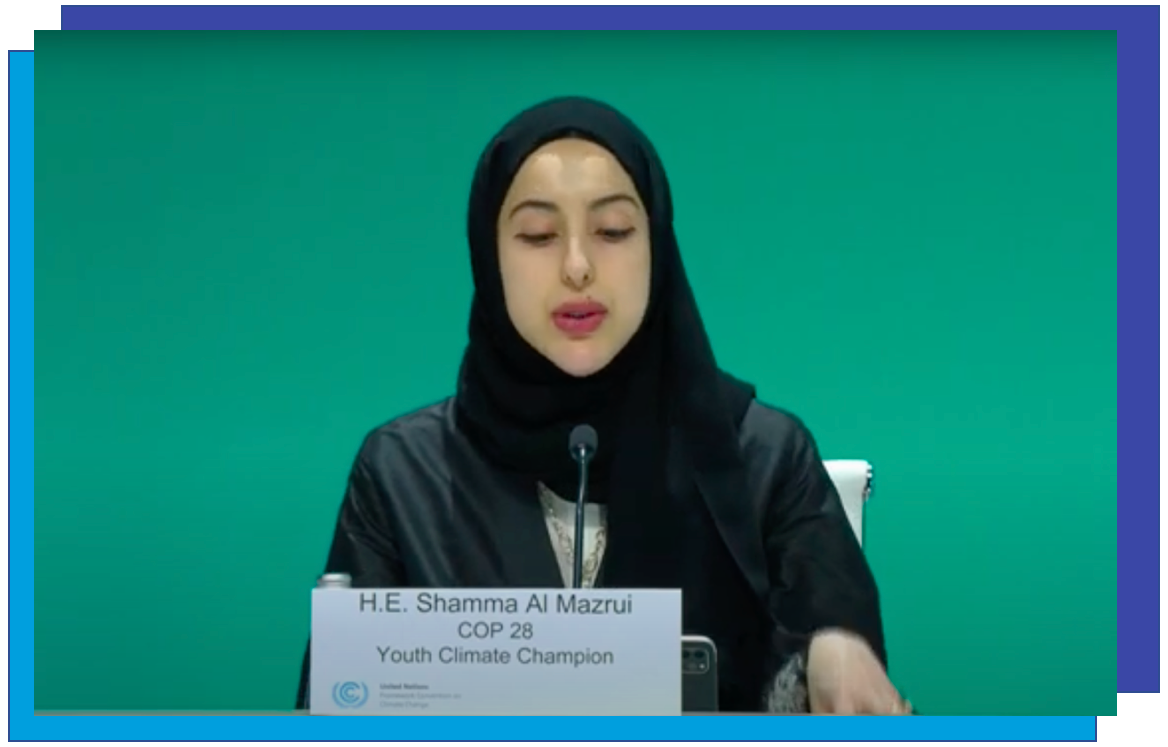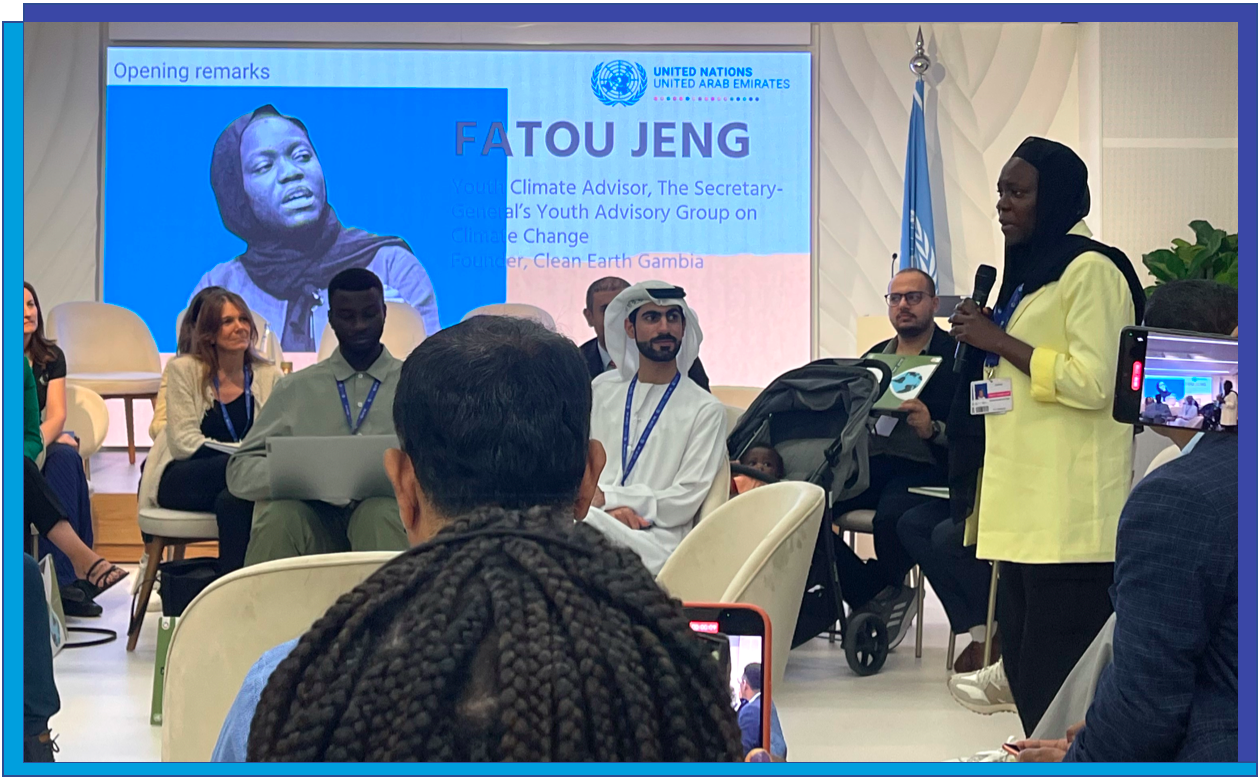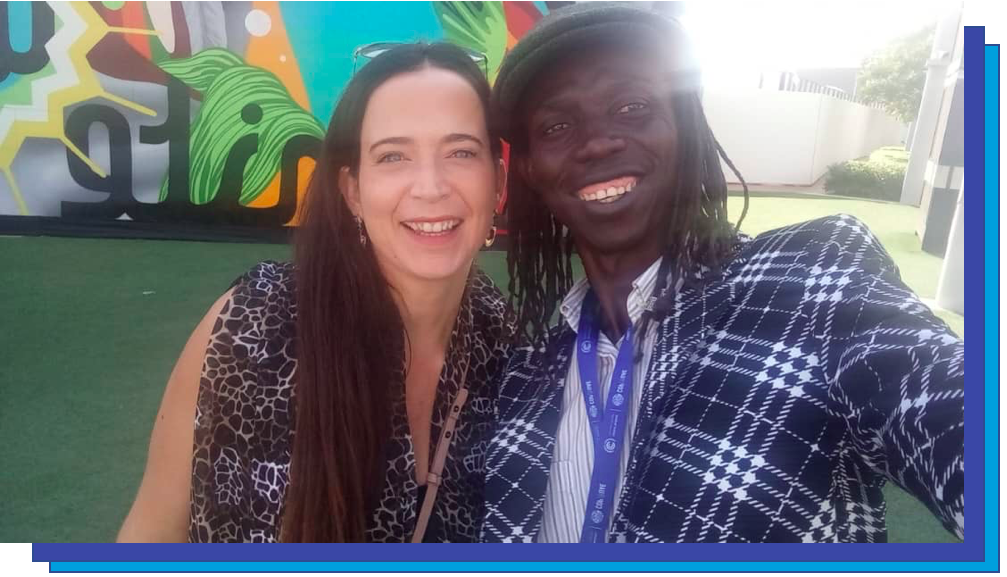INEEW actively participated in COP28 for the Youth Education and Children Day.
At INEEW, our proposal for addressing climate change aligns with our commitment to the SDG's (Sustainable Development Goals) and human well-being. Through emotional education, we advocate for decision-making rooted in awareness, coherence, equality, and sustainability to foster positive and impactful outcomes.
Here, we provide a comprehensive overview of the insights and perspectives shared during this significant event.
The recently concluded COP28 witnessed a groundbreaking moment for youth empowerment and climate action. H.E. Shamma Al Mazrui, Minister of Community Development, is the first-ever Youth Climate Champion with a Ministerial role. During the Youth Education and Children Day, she highlighted the importance of embracing linguistic diversity. She urged the global community to adopt the universal language of Youth, Empowerment, and Inclusion. She emphasized that this language, spoken passionately by the world's youth, has the power to unite nations in the face of the urgent climate crisis. Research shows that sharing a common language fosters collaboration, making it imperative for leaders to tune into the language of Youth to bridge the gap between intention and action.
 H.E. Shamma Al Mazrui, Minister of Community Development
H.E. Shamma Al Mazrui, Minister of Community Development
For the first time in COP history, youth played an integral role in internal negotiations, challenging the traditional observer position.
COP28 excelled in youth engagement, but the call is clear: this language of unity, inclusion, love, and empowerment must persist beyond the event. Ensuring the continued participation of youth in the decision making, laying the groundwork for a culture of inclusion and new solutions for a sustainable future.
As we reflect on COP28's impact, let us commit to preserving and reviving this language at every opportunity. The language of Youth, as the driving force for change, shapes our values, defines our goals, and propels us toward a more inclusive and sustainable future. it is not just a milestone; it's a commitment to viewing the world through a lens of unity and empowerment, fostering a culture that transcends boundaries and generations.
The language of Youth, empowerment and inclusion, that will resonate with the hearts and minds of young people and old alike because regression is what happens when this language fails.
Fatou Jeng, Policy Operations Lead for Women and Gender in the UNFCCC Youth Constituency (YOUNGO), emphasized the necessity of providing seats at decision-making tables for the youth and embracing a more inclusive perspective. She stressed that until all voices are heard, the recurring issues will persist, and new viewpoints are essential for obtaining realistic information about the local situations and effective solutions. Granting access and space to the youth is crucial for meaningful evolution in addressing the challenges of our time.
 Fatou Jeng, Policy Operations Lead for Women and Gender in the UNFCCC Youth Constituency (YOUNGO)
Fatou Jeng, Policy Operations Lead for Women and Gender in the UNFCCC Youth Constituency (YOUNGO)
Malang Sambou Manneh, Gambia's lead mitigation negotiator, highlighted the challenges in reaching agreements on enhanced strategies for phasing out fossil fuels. Highlighting the lack of a shared vision of impact due to varied effects, interests, and priorities. The assumption in negotiations is that all countries share a common vocabulary, neglecting the diverse local priorities where catastrophic effects jeopardize lives. He warned that without a shift in direction, Africa faces a bleak future of poverty and misery.
 Malang Sambou Manneh, Gambia's lead mitigation negotiator and Marta Bisquerra, founder of INEEW at COP28
Malang Sambou Manneh, Gambia's lead mitigation negotiator and Marta Bisquerra, founder of INEEW at COP28
Last but not least, we want to reflect on the words of Cimmena Chao that shared with us at Ciclos FEEM about "The role of emotional education in the socio-environmental crisis":
Emotional education plays a crucial role in environmental care, advocating for a conscious, coherent, and integral approach. This approach is vital for realizing the need to take action in the healing and restoration of the planet we inhabit.
What emotions come to mind when you think about a glacier's funeral? Celebrating the funeral of a glacier in Iceland in 2019 marks the definitive death of an ecosystem that will not return—a profound loss.
We may feel sadness, sorrow, anger at the reasons behind this circumstance, and fear of the danger of repetition.
What emotions arise from the demise of ecosystems? This question should remain in the consciousness of those of us who inhabit this planet.
Environmental well-being involves caring for the quality, diversity, and conservation of ecosystems. The UN warns in its declaration of the SDGs that the well-being of ecosystems directly impacts physical and mental health, thus affecting physical and emotional well-being, the material aspects of the economy, professional development, and ultimately influencing the development of societies, including displacement in terms of losing this sense of belonging.
The invitation is to start thinking about a much broader well-being and let's build with the purpose of placing global well-being at the center.
Finally, presenting the outcomes from COP28's Youth Education and Children Day, we are sharing key points that bridge well-being with the impact of climate change. These highlights underscore the critical connection between sustainability, youth empowerment, and the broader implications of climate action:
- Sustainable living is not a subject to study but a lifestyle; it requires a continuous and coherent approach to decision-making for lasting impact.
- Empowering youth with access, and the seats at decision-making tables is crucial. Giving them the place and space to be heard and understood. Without this, addressing longstanding issues remains a distant goal; intergenerational spaces are vital for effective policy-making.
- Inclusivity is key; actions must actively involve and anticipate the needs of all. A broad perspective ensures that the impact benefits everyone.
- The success of decisions lies in measurable outcomes defined by all interests. Goals achieved should be quantifiable, providing a clear understanding of the positive impact and progress made.
Prioritizing sustainability as a lifestyle, empowering youth in decision-making, ensuring inclusivity, and measuring impact are essential steps toward enhancing the well-being affected by the impact of climate change.